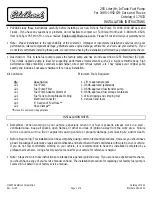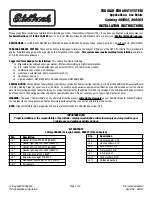
Wheel Nuts
All wheel nuts should be tightened occasionally to eliminate the possibility of wheel
studs being sheared or the bolt holes in the wheels becoming elongated. This is
especially important during the first few hundred miles/kilometers of operation to
allow the wheel nuts to become properly set. All wheel nuts should first be firmly
seated against the wheel. The wheel nuts should then be tightened to recommended
torque. Tighten the wheel nuts to final torque in increments. Progress around the bolt
circle, tightening the wheel nut opposite to the wheel nut just previously tightened
until final torque is achieved.
Recommended torques are shown in the following chart:
Disc Wheels
Nut Type
Stud Size
Hex Size
Torque
Ft Lbs
Torque
Newton Meters
Cone
M14 x 1.5
22 mm
130
176
Flanged
M14 x 1.5
22 mm
140
190
8-Stud — Dual Rear Wheels
• Dual wheels are flat-mounted and center-piloted. The lug nuts are a two-piece
assembly. When the tires are being rotated or replaced, clean these lug nuts and
add two drops of oil at the interface between the hex and the washer.
• Slots in the wheels will assist in prop-
erly orienting the inner and outer
wheels. Align these slots when assem-
bling the wheels for best access to the
tire valve on the inner wheel. The tires
of both dual wheels must be com-
pletely off the ground when tighten-
ing, to ensure wheel centering and
maximum wheel clamping.
• Dual wheel models require a special
heavy-duty lug nut tightening adapter
(included with the vehicle) to correctly
tighten the lug nuts. Also, when it is
necessary to remove and install dual
rear wheels, use a proper vehicle lift-
ing device.
NOTE:
When installing a spare tire as part of a dual rear wheel end combination, the tire
diameter of the two individual tires must be compared. If there is a significant
difference, the larger tire should be installed in a front location. The correct direction
of rotation for dual tire installations must also be observed.
Oil Interface Location
W H A T T O D O I N E M E R G E N C I E S
278
















































